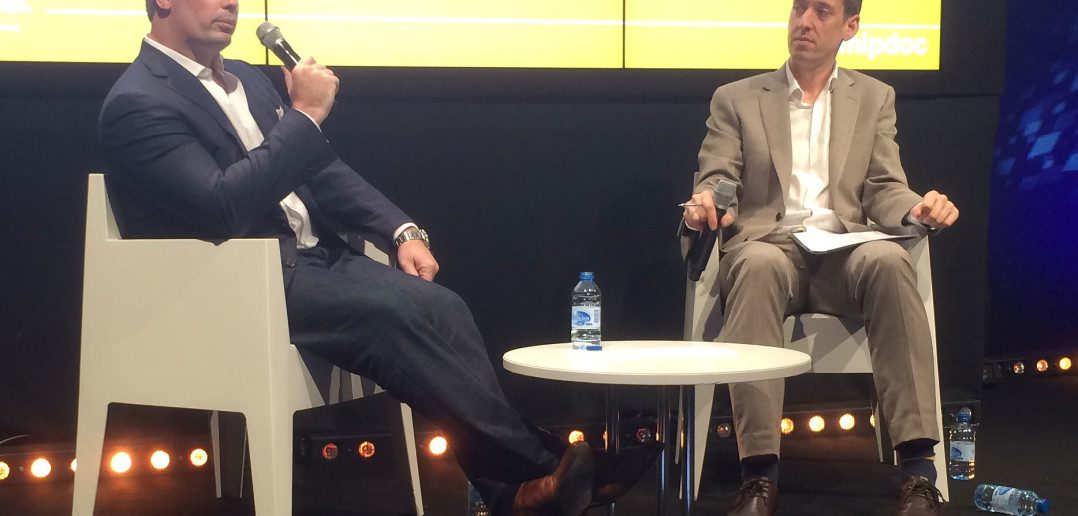The final keynote of this year’s MIPDoc conference saw Dean Possenniskie from A+E Networks take the stage to talk about the company’s channel, content distribution and digital media businesses. He was interviewed by Informa Media’s Stewart Clark (right), editor of industry magazine TBI.
He started by defining how A+E Networks sees itself in 2014. “First and foremost, we’re an entertainment company. Content is at the heart of our business,” he said. “We’re an entertainment company, but I would also say we are very much a leading content company.”
Possenniskie started there four years ago, and has seen a period of sustained investment in A+E’s international business. He admitted that the company is fortunate: every year, between 1,200 and 1,500 hours of shows come through its internal pipeline from the US. The company now has six channel brands in Europe, fuelled by this, and has been moving into a “wholly-owned” position in some countries where it previously participated in joint ventures with other broadcasters.
“I would certainly say there will be more movement, absolutely, both in Europe and in Asia, in markets where we have a range of different partners. All of our partners respect how strong A+E Networks is in the US,” he said.
Clarke then asked about A+E’s joint venture with BSkyB in the UK, and how that will evolve. “Hard to say right now,” said Possenniskie. “What I would say is they are a brilliant partner,” he said. “There is a lot we learn from Sky as a platform involved in our business, but also as a content partner… We’re very happy with the growth there. Sky sync with us somewhat, in that they’re very interested in international growth.”
Possenniskie said A+E is ramping up the quality of commissioners in its countries around the world, in order to bring in more original shows for local markets.
Clarke wondered whether there is any viewer fatigue around some of the shows that have made A+E so popular in the US: the personality-led factual shows like Pawn Stars and American Restoration. Is A+E thinking hard about how to bring fresh shows in, and keep those older franchises invigorated?
“I think we keep evolving. A while back, shows like Pawn Stars and Restoration were very strong, but we’ve evolved into new shows and franchises of late… just showing a different lifestyle, a different way of life,” he said. “As long as we’re leading and bringing new content, which we will, we’re continuing to see success in these formats.” He also suggested that there is success to be found in localising some of the big US formats for local markets.
Possenniskie talked about international co-productions within the group, including a new series called World Wars, blending CGI, reenactment and a range of world leaders giving interviews, evolving a template first established with The Men Who Built America. “It was a true collaboration with our team,” he said. “To fund it at the level that we want to fund it at, to make that type of quality The Men Who Built America event, we had to… This is something I think you’ll see more of from our international channel group: finding big stories, big events, big characters.”
He was asked what the best way is for producers to work with A+E around the world. “Going local is best. We’ve got commissioners in all markets: they’re very active, they’ll be at markets, at festivals, on panels. By all means reach out directly to them,” he said. “We are moving more and more now in markets to have regular briefings with our partners and the wider production community to talk to them… and have them pitch back.”
The network is looking more and more for short-running 6-10 hour series – he cited Gangs of Britain in the UK as one recent successful example of that. Possenniskie said the company is committed to working with a range of partners, from the big firms through to smaller, boutique producers. “Not too many of those left, though,” he suggested.
How does it approach the issue of rights? Would it expect to take all of the rights to exploit internationally? “Our model in the US, has been about ownership: about being there in the inception and creation of the programming at that early stage, and having global ownership,” he said. “Where and when we can locally, we will. We know that we need to invest to do that… We feel we’re in a really strong place to represent the investment well from a distribution point of view.” But he admitted that A+E doesn’t have these global rights in every instance.
Clarke asked about free-to-air television – not an area A+E plays much in at the moment. “There’s plenty of growth for us at the moment in pay TV,” he said. “It’s interesting for us when we are distributing our content in the free-to-air market and we can see the audience performance of a Pawn Stars or a Storage Wars in the free-to-air space. We know the content works, and there will be opportunities I’m sure.”
A+E as a channel brand launched in France last year. What can be expected this year elsewhere in Europe? “You will see A+E launch in more major European markets this year. I’m really excited about it. It’s a brand we can build through the programming, through the personalities.”
Scripted programming is on the agenda too, through the A+E Studios division. It’s complicated internationally though: shows like Vikings effectively have to be acquired by A+E’s international channels if they want to show them. “Vikings did run in Poland very successfully, it will run in the UK, we are looking at other markets. A show like Houdini that’s coming down the pipeline, we are looking at,” he said. “When it comes to originating scripted from our channels, and my colleagues can correct me if I’m wrong, I don’t think we’re quite there yet… Down the track, possibly.”
Is A+E now more ‘entertainment’ than ‘arts’ (the A and E of its name) suggested one questioner from the audience. Is there a disconnect between the high-end World Wars-style shows and those like Storage Wars?
“We don’t define A+E. When we launched in France, we don’t go out and explain technically what the letters represent… A+E is a very fresh, new factual entertainment channel,” he said. “History is factual entertainment, and within that entertainment there’s always going to be an element of information and discovery. That’s very important to us… You’ll learn something from the experience.” He said that A+E’s H2 channel is now what people would have associated the History channel with 10 years ago.
He talked possible future plans, including diversifying into other genres. “I could not see us going out and buying a sports network,” he said. “But lifestyle is something we can bring something different to… Never say never: there might be something that comes up tomorrow that feels like the right bolt-on.”
But he said Europe should expect to see more A+E channels and H2 channels in the near future. “I’m very focused on H2 as well as A+E as a network. I think you’ll begin to see more formats being adapted by our channels and markets: more local formats. And hopefully you’ll see more big productions… We’re not going to take our eye off the ball on these big set-piece events.”




